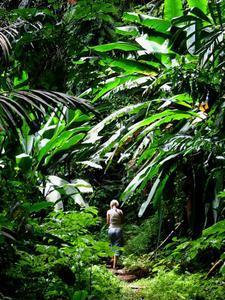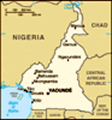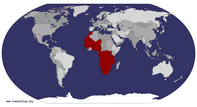Advertisement
Published: October 5th 2006

 Rainforest
Rainforest
Thick, humid and sticky. A jungle walk at Limbé.Through the glass ceiling the night sky was reflected in the main pool of the closed public swimming pool facility.
It must have been after midnight and I stood at the end of the 50 metres long pool, watching the stars in the dark calm water when I suddenly felt a disturbing presence of something. I felt like I was being watched.
To chase my fear away, I gave the room a quick glace, expecting that relieving feeling of being silly, that I always get when I realize that I'm only being paranoid.
Instead I froze.
At the other end of the pool I could see the shape of a man. He wore a dark blue cloak of unknown material and of no importance since all my gathered attention narrowed down to his right hand. Like if it was part of his body - a two feet long machete hung in a firm grip from the hand.
My heart stopped for an eternity that ended with a cracking, scraping noise.
I looked over my right shoulder towards the toddler's pool and the hallway leading to the changing rooms and the gymnasium.
There, only eight or

 The woman with the white umbrella
The woman with the white umbrella
At Debundscha the average annual rainfall is 9 metres. In a good (bad?) year it can rain up to 15 metres. That's a lot.nine metres away from me, another shape stood. Cloak and dagger.
Once more I heard the scraping noise. And then a loud voice:
-Wake up to pray! The preacher announced in the boat's P.A.-system with a loud scrunch.
-Wake up in the name of the glorious Jeeeesuss! I could have hugged him for taking me out of my antimalarial-drug-infected "
land of Nod".
I stepped outside and walked up to the stem. The sky over the
Bight of Biafra was a grey suspicion of dusk. In the constant drizzle I remained for four hours with the soothing somber sound of
Nick Drake in my headphones, and then out of the fog she appeared. First like a darker nuance of grey, but as we went closer, the entire body was laid bare.
Mount Cameroon; 4095 metres of volcanic rock rising straight out of the ocean, by far the highest mountain in West Africa, and an unmatched first sight of mainland Cameroon.
A few hours later we arrived in the friendly town of
Limbé - a slice of paradise on a sunny day - but now, at the end of the rainy

 Porcelaine flower
Porcelaine flower
Lit by a thin ray of light that broke through the thick canopy in the jungle near Limbé.season, the sunny days could be counted on the hand of a leper.
Still we staid for a week, the English speaking population were very friendly and outgoing, which made it hard for us to leave.
We went to
Idenao - a smugglers town at the foot of Mount Cameroon, and to
Debundscha - the second wettest place on earth. A fact that the locals are very proud of, and quickly points out to you. This is not needed, since the lush and evergreen, surrounding nature along with the constant rain, makes it hard not to notice that the place is extremely wet.
And so was the nearby black sand beach too, where a glimpse of the sun is rare.
Back in Limbé we spent our last night out with the national pastime; Beer drinking (Cameroon was the first country in Africa with a brewery and has today the widest variety of beer in Africa.) in the company of "
Isaac the midget" giving us a much appreciated sit-down tap-dance show. It all felt very
David Lynch, furthermore as we got a lift out of Limbé with the peculiar and bald "
Curly Jackson", to the town of
Muea.

 The Race of Hope
The Race of Hope
Called the hardest race on the planet. The Race of Hope is done once a year in the end of February. Some 400 hundred people compete in reaching the summit of Mount Cameroon and back down again in the quickest time. The men's record is 4 and a half hour, and the womens 5 and a half. It took me thirteen.... Hut 2 at Mount Cameroon.There we had a chat with the local king who told us of heroic acts that he had done (real or imaginary we don't know), and asked us to stay at his hotel.
We didn't, instead we walked the steep six kilometres (climbing 250 metres in altitude) to
Buea - the tropical
Tyrol.
It was once the capital of German Kamerun, which is still seen in the architecture and felt in the bars, where full voluptuous women balance trays with tankards of
Satzenbrau, Mutzig and
Kronenbourg. The only thing missing was lederhosen unt edelweiss.
As soon as I had seen the mountain one week earlier, I knew that I could not leave the country without at least trying to climb it. A guide was mandatory, and a self-satisfied stout man had monopoly on issuing permits and allotting guides. The initial price was ridiculous, but like everything else, adjustable by bargaining.
Only six people had tried an ascent during the last four months of rainy season, I noticed as I glanced through his register.
Since everyone I had spoken to in Limbé and in Buea had told me that the climb was close to impossible,

 Always behind
Always behind
Apparently my guide had run the race of hope 26 times, which was world record, also was he the oldest person running it. His best position was number 6 (20 years ago). But he still hoped to win next year. Close to the summit, lava formations in the background.I was hoping to get a strong and vigorous young guide that could carry me down the mountain in case of an emergency.
Instead I was allocated an old man. At first I got disappointed, but then, as he bragged on about how many times he had done the climb, how many times he'd done the raise of hope, and that the U.S. had cancelled his visa because they feared he would win the
New York marathon otherwise - I got more confidence in his abilities.
On the recommendation of the self-satisfied manager of the tourist board I bought an enormous amount of food for the climb, then went back to our guesthouse for a bad nights sleep.
It was four o’ clock in the morning. Illuminated only by the diminishing sliver of the moon ant the guide's defective torch, we started our ascent. The
Sisyphus stone of edibles weighed heavy on my back while I followed behind the guide as he mislead us three times before we had even got out of the village.
An hour and a half later, we had passed the most slippery part of the climb. On small paths

 Apex
Apex
Often totally shrouded in mist, I was lucky to at least see the upper slopes of the mountain. From the summit of mount Cameroon.leading through the dense and wet forest we had reached the first hut.
I felt that he slowed me down, and the constant bragging very tiresome, so I decided to walk ahead.
The next part was less lenient. As the forest abruptly ended, a steep and wet grassland continued up to the second hut. Now the guide was far behind, and I sat waiting for 15 minutes before he arrived, tired after the arduous ascent.
It took him over an hour to boil a cup of tea and then we continued upwards.
The high turfs of grass grew thinner and as I reached the third hut all that was left was volcanic rock, lichen and a peculiar flower.
Awaited the guide and tried to eat some of the food I carried, to lessen the heavy burden.
From the third hut it was only 35 minutes to the summit and I felt a bit disappointed as I reached it around noon.
I had expected the ascent to be much more difficult and I had carried way to many supplies up the mountain. I felt a bit tricked by everyone I spoke to prior to the

 Doris
Doris
A friend in Limbé.climb, for advising me against even trying, and then later encouraging me to bring all that unnecessary food I now carried.
Some minutes later the guide arrived to congratulate me for the anticlimax, I took some bad photos and we went down. This was when I realized that reaching the summit is only half the problem with climbing a mountain. After about an hour of descending I felt a growing pain in my knees. And as we reached Buea again, my legs were like spaghetti with my kneecaps being the buttery bolognaise.
The old mountain goat was a bit grumpy since I had run ahead of him during the descent. Still he wanted me to become his sponsor and donate a lot of money for the next race of hope. And he explained - with simulated intelligence - about al the benefits of corruption.
-How efficient it must be. I thought as I looked him in the eyes and all I could see was the governmental propaganda machinery.
I didn't give him any tip.
The next day (and for the following week) I wasn't so cocky since I could hardly walk, last time I did

 Vegetation
Vegetation
It's a great pleasure to travel through landscapes like this. Between Debundscha and Idenao a friendly expat took us for a ride.anything this physically demanding was probably in the last millennium.
I stumbled into a taxi and we went down the mountain, leaving the friendly Anglophone part for the economical capital;
Douala - with its francophone dog-eat-dog mentality.
Got ripped off without any other option than to get ripped off and the left for the capital
Yaoundé. A beautiful city spread out on steep hills, with gaudy, avant-garde high-rise-architecture constituting the city centre.
But just like in Douala there’s a lot of xenophobia under the surface and at times above the surface too.
Officially the country is bilingual, but that’s far from true. In the Anglophone part people hardly speak a word French, and in the francophone part people stubbornly refuse to utter a word in English. People identify themselves strongly with the old colonial languages - dividing the country in two - which is one of the reasons the evil president
Paul Biya has kept swaying the sceptre of power for 24 years.
The country is also divided with Muslims in the north and Christians in the south and there are 280 different ethnic tribes, making it impossible to unite an, opposition against the oppressive

 The last trees
The last trees
Before reaching hut two, the last trees appeared in the mist. Mt Cameroonand corrupt government.
For some reason there’s a lot of bad attitude in the francophone part. Crossing the linguistic barrier was like entering a whole new country. The bad attitude was well represented at the embassies to the neighbouring “banana republics” of Central Africa, too.
At the Gabonese embassy we were refused entry because of dress code (?) And there was a sign outside about the silly dressing rules. These malevolent and self-important embassy staff, charge a fortune to issue a visa and can at any time with a whim, refuse to do so.
I was looking for the sign saying:
If you are one of the lucky few to meet with our extremely honourable Mr Ambassador, you must address him:
-My royal highness and golden master of Excellency. In this part of the world there’s no limit for hubris.
Had a similar problem at the D.R.C. embassy, the Congo embassy was way too expensive, and the Equatorial Guinea embassy was just a bad joke.
We had to leave the big city and give the countryside a new try a second try. Up north we went, first to
Bangangte and

 The African Umbrellas
The African Umbrellas
A house in Buea, beneath it Cocoyam plants with their big leaves. I used one as an umbrella one rainy day, much to the amusement of the people in Limbé.then on to
Bafang on Swtizerlandish roads climbing high above the tranquil valleys from where smoke rose as the villagers were preparing food.
An hour before sunset we sat down with a cold
Guinness overlooking the magnificent landscape of the forested hills disappearing into the horizon. Around us wooden-plank houses leaned at the brink of falling and smiled with their open doors - like toothless old men with a little too much whisky inside their waistcoats. Wild grown gardens of vines and fern crawled up onto the rickety porches and the extra plates of corrugated iron did their best to protect the long lines of laundry from the heavy rains.
The smell of roasting peanuts and newly burnt grass added to the feeling of a perfect late summer eve.
The next morning we were back on the road again in a bush taxi going south.
This region with its fertile soil, tropical temperature and heavy rains, is like a fruit-salad.
Huge papaya and banana fields, Cashew groves, pineapple fields, citrus-fruits along the roadsides and avocado trees in many of the gardens.
A fruit-salad garnished with some nineteen military check posts.
After showing our

 Lobe waterfalls
Lobe waterfalls
After eight kilometres of walking along the beach south of Kribi, one reaches the Lobe waterfalls. The surrounding nature is very beautiful, but there's a lot of hustle from potential "guides".passports, yellow fever vaccination cards, and answering unnecessary questions too many times we arrived in the hectic Douala again.
On our way into the centre there was a traffic jam. Some twenty minutes of queuing later, we saw the reason for the delays.
A car had hit a motorcycle and the bike lay demolished on the ground in front of the car.
The windshield of the car was cracked in a mosaic patter, at which epicentre a red and white baseball cap lay.
Then, from that spot - as a tree puts out its tendrils - blood ran over the bonnet and down the sides of the car.
Suddenly - always happens so quickly. I thought as we passed the tragic site.
Enjoyed the high military presence (a good indicator of how badly a country is governed) in Douala once more and then took a bus further south to
Kribi - Cameroon’s claim for beach fame.
Mostly rich Cameroonians from Douala and Yaoundé come here to flash their money and designer clothes, but also old French sex-tourists come for a weekend on the beach.
Heading north from Kribi there are many small

 Botanic garden
Botanic garden
An outdoor scene with natural seats all covered in moss. Limbé's botanical garden.strands with white perfect sand and expensive restaurants, the same thing for the eight kilometres long stretch south of Kribi towards the
Lobe waterfalls.
We truly enjoyed walking along the coastline, every now and then taking a dip in the murky waves. In the less continental, more local restaurants they offered monitor lizards (we saw them catch them on the beach), pangolin and giant forest frogs (being as big as cats) - hanging upside down outside the kitchens, displaying their big saffron yellow undersides.
A scam attempt by an internet-café and some drunken francophone hospitality later, it was time to leave. Thanks to the heavy rains the road to nearby
Ebolowa was impassable, so we had to make a long detour back up north to Yaoundé, down south again for Ebolowa, and finally through the dense and sticky jungle to
Ambam - the border town with Gabon and Equatorial Guinea.
We made friends with the innkeeper of a colourful bar over a couple of bottles, and carefully listened to him complaining about the corrupt government, the bullying police and the extortion at the military check posts.
As the sun rose we stood bargaining with a group of

 Evil empire
Evil empire
The church tower overlooking the bar-street at Kribi.young whippersnappers at the motor park over the price of the bush-taxi. After some time of heavy discussion we could finally get the normal price and we sat out towards the border.
The day had come for us to cross the equator, and get closer to the heart of darkness.
Advertisement
Tot: 0.111s; Tpl: 0.016s; cc: 8; qc: 30; dbt: 0.0442s; 1; m:domysql w:travelblog (10.17.0.13); sld: 1;
; mem: 1.2mb



















































Kate Hildebrand
Kate Hildebrand
great blog
I'm learning a lot!